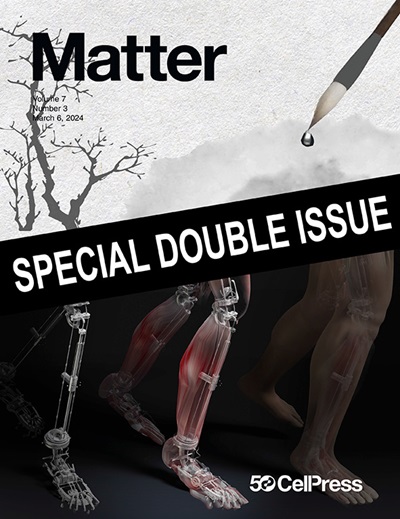A data-driven platform for automated characterization of polymer electrolytes
IF 17.3
1区 材料科学
Q1 MATERIALS SCIENCE, MULTIDISCIPLINARY
引用次数: 0
Abstract
Lithium-ion batteries aid decarbonization by enabling electric vehicles and renewable energy generation, but these applications put increasing demands on the energy density, safety, and cost of batteries. Polymer electrolytes could improve battery safety but currently do not have sufficient ionic conductivity for ambient operation. To address this challenge, we developed a high-throughput platform to increase the speed and scale of polymer electrolyte research, enabling the acquisition of data for over 60 samples per researcher hour. We utilized automated formulation and characterization operations, including electrochemical impedance spectroscopy with in situ thickness measurements, to perform a comparison of lithium and sodium salts in poly(ethylene oxide). Our study provides a high-quality, unified reference dataset for the community and greatly expands available data for sodium-based electrolytes. Secondly, our large dataset allows us to find that the local minima in glass transition temperature that corresponds to maximum ionic conductivity is a colligative property independent of either anion or cation chemistry.

一个数据驱动的平台,用于聚合物电解质的自动表征
锂离子电池可用于电动汽车和可再生能源发电,从而有助于去碳化,但这些应用对电池的能量密度、安全性和成本提出了越来越高的要求。聚合物电解质可以提高电池的安全性,但目前还没有足够的离子导电性来满足环境操作的要求。为了应对这一挑战,我们开发了一个高通量平台,以提高聚合物电解质研究的速度和规模,使研究人员每小时能够采集 60 多个样品的数据。我们利用自动配制和表征操作(包括电化学阻抗光谱和原位厚度测量)对聚环氧乙烷中的锂盐和钠盐进行了比较。我们的研究为业界提供了一个高质量的统一参考数据集,并大大扩展了钠基电解质的可用数据。其次,我们的大型数据集让我们发现,与最大离子电导率相对应的玻璃化转变温度的局部最小值是一种与阴离子或阳离子化学性质无关的共轭特性。
本文章由计算机程序翻译,如有差异,请以英文原文为准。
求助全文
约1分钟内获得全文
求助全文
来源期刊

Matter
MATERIALS SCIENCE, MULTIDISCIPLINARY-
CiteScore
26.30
自引率
2.60%
发文量
367
期刊介绍:
Matter, a monthly journal affiliated with Cell, spans the broad field of materials science from nano to macro levels,covering fundamentals to applications. Embracing groundbreaking technologies,it includes full-length research articles,reviews, perspectives,previews, opinions, personnel stories, and general editorial content.
Matter aims to be the primary resource for researchers in academia and industry, inspiring the next generation of materials scientists.
 求助内容:
求助内容: 应助结果提醒方式:
应助结果提醒方式:


